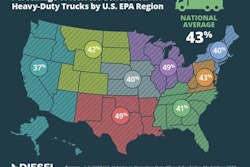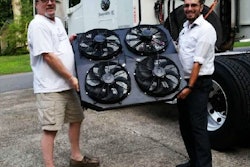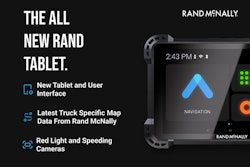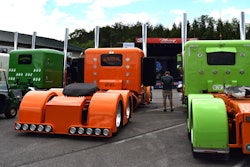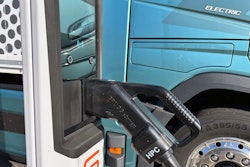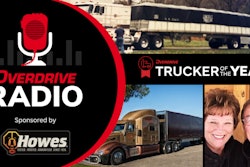Owner-operator Glen Rice is based today in New Smyrna Beach, Fla., hauling leased to R&R Express of Crayton, Pa., for more than eight years now. With his fiancee and ridealong business partner Bernice King, he rolls in the truck shown above, his 2006-emissions-spec Caterpillar C15-powered 2007 KW, which has been benefiting the last couple of years from a bypass-oil-filtration and fuel-additive system Rice purchased from the Clean Air Fleet company. The oil filter medium in the system filters out particles down to 1 micron. With it on-board, Rice has extended his typical oil-change interval from about 10,000-15,000 miles to 40,000 miles or more.
Instead of changing the oil so often, at a cost he estimates at around $275 each time, he changes his main engine oil filter and the filter media in the bypass system instead — total cost: around $90, or a $185 savings every 10,000 miles. With the bypass system costing around $1,100 installed, Rice notes, it pays for itself pretty quickly.
The savings on oil changes are the most readily quantifiable benefits of such a system, but what brothers Kurt and Clint Braunel, founders of Clean Air Fleet, see as the system’s biggest benefit is longer-term savings on maintenance, particularly for owner-operators and fleets with later-model-emissions-spec engines.
“Basically,” Kurt says, “we got started when ultra-low-sulfur diesel came out. We recognized a huge opportunity with the fuel change and the loss of lubricity” in the fuel spec. “We also realized we could lower the emissions coming out of the tailpipe, noticeably,” simply with a fuel additive the two developed that could help deliver a cleaner burn.
Initially, Kurt adds, given the company’s Clean Air Fleet name, plenty around trucking asked if they were tree huggers or something. So many people, he says, just didn’t care much about emissions. “We started working with governments who were taking voluntary measures to help lower their emissions,” he says. “And of course we realized that maybe [some truckers] don’t care about the air quality so much, but they do care about how their truck is running.”
Clint adds that U.S. standards for fuel are lower than many nations’, citing Europe’s higher centane minimums. When you’re filling the tanks and running down the road without treating the fuel, “you’re running fuel on minimum specs,” he says. “We’re taking your run of the mill fuel that’s cheap and turning it into a premium fuel” with the additive.
As attitudes to some extent have shifted around emissions — “I know a guy who’d done deletes in the past,” Kurt says, “whose got three kids now and went with a full-emissions motor” – so too have things changed for the Braunels’ company since those early days, more than 10 years ago now. As maintenance issues compounded around emissions systems in the wake of the diesel particulate filter, first required with the 2007 diesel emissions spec, “we started to figure out there needs to be solutions to some of these problems,” Kurt adds. They say their additive, delivering a cleaner burn, combined with bypass oil filtration of particles down to 1 micron and advanced fuel filtration as well, provides a long-term benefit for today’s diesels, reducing maintenance costs.

